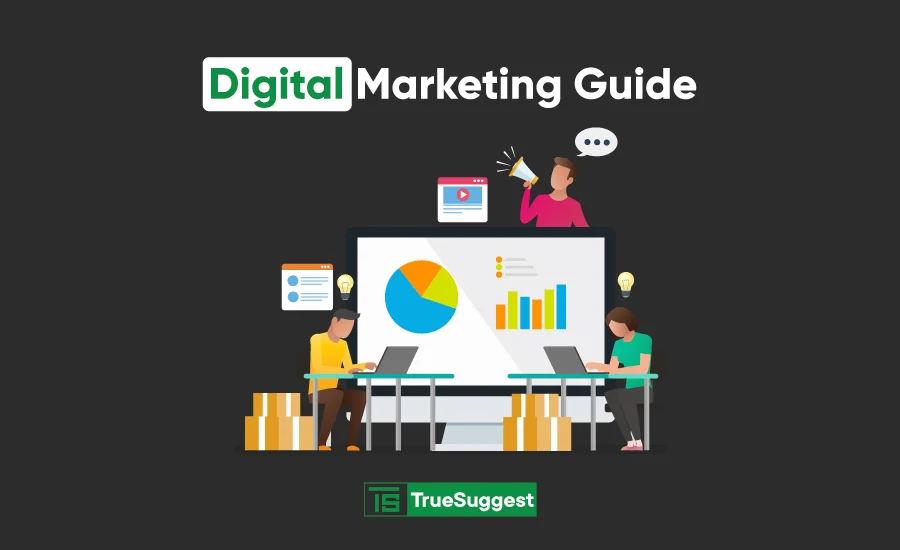What Is Digital Marketing

Digital marketing refers to the use of digital channels, platforms, and technologies to promote products, services, and brands. Unlike traditional marketing, which relies on physical mediums like print ads and billboards, digital marketing leverages online platforms such as social media, search engines, email, and websites to reach and engage consumers. This modern approach allows businesses to connect with their target audience more effectively, track engagement, and measure results in real-time, making it an essential component of any successful marketing strategy.
What Is Digital Marketing?
Digital marketing encompasses a wide range of online marketing activities to attract, engage, and convert customers. At its core, digital marketing involves leveraging various digital channels like search engines, social media, email, and websites to reach a broader audience. It includes tactics such as search engine optimization (SEO), content marketing, social media marketing, email marketing, pay-per-click (PPC) advertising, and affiliate marketing. These tactics serve a specific purpose in guiding potential customers through the marketing funnel, from awareness to conversion. With the increasing prevalence of the internet and mobile devices, digital marketing has become a vital tool for businesses of all sizes to enhance their visibility, drive traffic, and generate leads.
Why Digital Marketing Matters
Digital marketing is crucial for several reasons.it allows businesses to reach a global audience at a fraction of the cost of traditional marketing methods. Unlike traditional advertising, which can be expensive and often ineffective, digital marketing enables precise targeting of specific demographics, ensuring that marketing efforts are focused on the right audience.
Digital marketing offers unparalleled opportunities for engagement and interaction with customers. Social media platforms, for example, provide a space for businesses to communicate directly with their audience, build relationships, and foster loyalty. Through content marketing, businesses can provide valuable information that educates and entertains their audience, positioning themselves as thought leaders in their industry.
Digital marketing provides measurable results. Advanced analytics tools allow businesses to track the performance of their campaigns in real-time. Metrics such as click-through rates, conversion rates, and return on investment (ROI) can be monitored and analyzed, providing valuable insights into what works and what doesn’t. This data-driven approach allows for continuous optimization and improvement of marketing strategies.
Digital marketing is essential in today’s digital age, where consumers spend a significant amount of time online. With the majority of people using the internet to research products, read reviews, and make purchasing decisions, having a strong online presence is crucial for any business. Digital marketing ensures that businesses are visible where their potential customers are looking, increasing the chances of attracting and converting leads.
Digital marketing levels the playing field for small and medium-sized enterprises (SMEs). Unlike traditional marketing channels that often favor large corporations with substantial budgets, digital marketing offers affordable options for businesses of all sizes. This democratization of marketing allows smaller businesses to compete with larger ones, reach new markets, and grow their customer base.
Digital marketing is adaptable and flexible. It allows businesses to quickly adjust their strategies in response to market trends and consumer behavior. For instance, a social media campaign can be modified or paused based on real-time feedback, while SEO strategies can be refined to improve search engine rankings. This agility ensures that businesses can stay relevant and competitive in a fast-paced digital landscape.
How Digital Marketing Works
Digital marketing works by utilizing various online channels and strategies to promote products and services. The process begins with identifying the target audience and understanding their needs, preferences, and online behavior. This information is then used to create a comprehensive digital marketing strategy that outlines the goals, tactics, and metrics for success.
One of the primary components of digital marketing is search engine optimization (SEO). SEO involves optimizing a website’s content, structure, and technical aspects to improve its visibility on search engines like Google.
By appearing higher in search engine results pages (SERPs), businesses can attract more organic traffic to their website.
Content marketing is another critical element of digital marketing. It involves creating and distributing valuable, relevant, and consistent content to attract and engage a target audience.
This can include blog posts, articles, videos, infographics, and more. The goal is to provide information that addresses the audience’s pain points and establishes the business as a trusted authority in its industry.
Social media marketing leverages platforms like Facebook, Instagram, Twitter, LinkedIn, and others to connect with potential customers. Through regular posts, engaging content, and targeted ads, businesses can build a community of followers and drive traffic to their website. Social media also allows for direct interaction with customers, providing an opportunity to build relationships and gather feedback.
Email marketing involves sending targeted messages to a list of subscribers. This can include promotional offers, newsletters, product updates, and personalized content.
Email marketing is effective because it allows businesses to reach customers directly in their inbox and nurture leads over time.
Pay-per-click (PPC) advertising is a method where businesses pay a fee each time their ad is clicked. These ads can appear on search engines, social media platforms, and other websites.
PPC campaigns are highly targeted, allowing businesses to reach specific demographics based on keywords, location, interests, and other criteria.
Affiliate marketing is a performance-based strategy where businesses partner with affiliates to promote their products or services. Affiliates earn a commission for each sale generated through their referral. This strategy helps businesses expand their reach and tap into new markets without a significant upfront investment.
Benefits of Digital Marketing
Digital marketing offers numerous benefits that make it an indispensable part of any modern business strategy. Here are some of the key advantages:
Global Reach
Digital marketing enables businesses to reach a worldwide audience. Unlike traditional marketing, which is often limited by geography, digital channels allow businesses to connect with customers from anywhere in the world. This opens up new markets and growth opportunities.
Cost-Effective
Digital marketing is often more affordable than traditional marketing methods. For example, social media marketing and email campaigns can be conducted at a fraction of the cost of print or TV ads. This makes digital marketing accessible to businesses of all sizes.
Targeted Marketing
Digital marketing allows for precise targeting. Businesses can use data and analytics to identify and reach specific demographics, ensuring that their marketing efforts are directed at the most relevant audience. This leads to higher conversion rates and a better return on investment.
Measurable Results
One of the most significant benefits of digital marketing is the ability to track and measure results in real-time. Analytics tools provide insights into campaign performance, customer behavior, and overall effectiveness. This data-driven approach enables businesses to optimize their strategies and improve their outcomes.
Enhanced Engagement
Digital marketing offers multiple channels for engaging with customers.Social media platforms, blogs, and email campaigns allow for direct interaction, feedback, and relationship building. This engagement helps foster customer loyalty and trust.
Flexibility and Adaptability
Digital marketing strategies can be quickly adjusted in response to market trends and consumer behavior. This flexibility ensures that businesses can stay relevant and competitive. For example, a company can launch a new social media campaign in response to a trending topic or update its SEO strategy based on changes in search engine algorithms.
Improved Conversion Rates
Digital marketing tactics such as email marketing, PPC advertising, and retargeting are designed to convert leads into customers. By targeting specific segments and personalizing content, businesses can increase their conversion rates and drive sales.
Brand Building
Digital marketing helps businesses build and enhance their brand presence online. Consistent, high-quality content, along with active engagement on social media, contributes to a positive brand image. This visibility and credibility can differentiate a business from its competitors.
Access to a Broader Audience
With the rise of mobile devices, more people are accessing the internet on the go. Digital marketing ensures that businesses can reach this mobile audience through responsive websites, mobile apps, and targeted mobile ads.
Competitive Advantage
In today’s digital age, having a robust digital marketing strategy is crucial for staying competitive. Businesses that leverage digital channels effectively can gain an edge over competitors who rely solely on traditional methods.
Endnote
By incorporating digital marketing into their overall strategy, businesses can enjoy these benefits and achieve their marketing goals more efficiently and effectively.






























